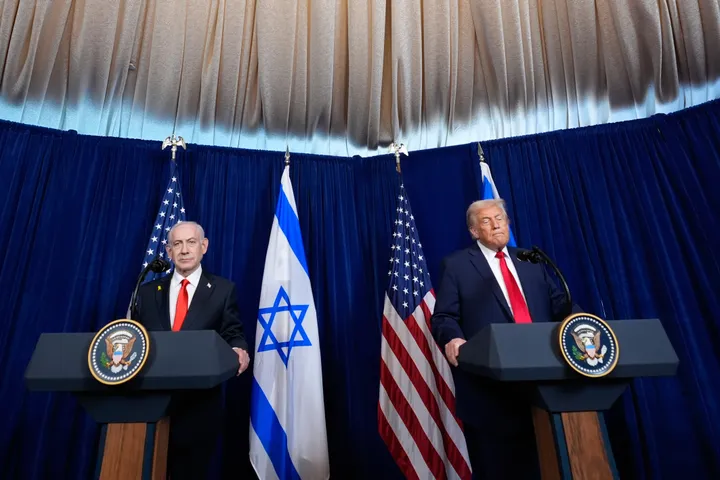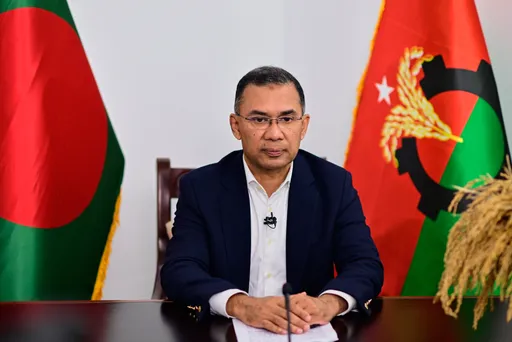Israel and Sudan are heading towards forging normal relations for the first time, the Israeli government said on Monday after Israeli Prime Minister Benjamin Netanyahu and Sudan’s transitional council leader Abdel Fattah al Burhan had a two-hour secret meeting in Uganda.
Netanyahu was quick to announce the outcome of the meeting.
"History!," he said in a tweet.
In what appears to be a landmark breakthrough in the region, Netanyahu and Burhan have "agreed to start cooperation leading to normalisation of the relationship between the two countries", the Israeli statement said.
The two leaders, however, carry different ambitions and expect different outcomes from the meeting.
Sudan's internal rift
Different reactions from Sudanese officials right after the meeting shine light on the country’s complex political dimensions.
Going through a critical transition, Sudan is run by a sovereign council that is a transitional body of military officials and civilians, headed by military general Burhan.
The council was formed as part of the power-sharing deal between the civilian bloc, who for months protested against the long-serving dictator Omar al Bashir. As the protests culminated in a military coup leading to Bashir's removal, Burhan took over the reins of the country.
Although the civilian bloc sat with the military, which is accused of “stealing the revolution,” to make a deal, their conflicting visions often reveal cracks in the governing system.
Burhan's meeting with Netanyahu is the latest example.
Foreign Minister Asmaa Mohammed Abdullah told Al Jazeera that she had learned about Burhan’s meeting with Netanyahu through the media and has no further information about it.
Sudanese Government Spokesman Faisal Mohamed Salih said the cabinet only learned of the talks through the media.
"We, the members of the cabinet, were not notified or consulted about this meeting. We are waiting for the chief of the sovereign council to return and give clarification about this," Salih said in a statement.
However, it seems that while the civilian side of the transitional council was not aware of the meeting, the military, that is backed by Saudi Arabia and United Arab Emirates (UAE), knew about it from the beginning.
A senior Sudanese military official who spoke to the Associated Press news agency anonymously said the meeting was orchestrated by the UAE, adding that only a “small circle” of top officials in Sudan, as well as Saudi Arabia and Egypt, knew about the Burhan’s meeting with Netanyahu.
The meeting is a part of the Sudanese effort, asking Israel to encourage President Donald Trump to change Sudan’s designation as a state sponsor of terrorism and to lift severe sanctions.
As Sudan binds up its wounds following Bashir’s rule, the country’s status impedes badly needed international financial assistance and commercial activity in Sudan.
The Israeli statement said Netanyahu believed “Sudan is headed in a new positive direction” and that he had expressed this view to US Secretary of State Mike Pompeo.
Just a day before the Burhan-Netanyahu meeting, Pompeo spoke to the Sudanese general by telephone and "thanked" the general for his "leadership in normalising ties with Israel" the US State Department said.
It said that Pompeo invited Burhan to visit Washington and voiced willingness to work towards "a stronger, healthier US-Sudan bilateral relationship" State Department Spokeswoman Morgan Ortagus said.
The Israeli side
While Sudan seeks Israeli mediation, Israel, on the other hand, sees the rapprochement as an opportunity to cultivate new alliances with estranged African nations.
Since 1960s, most of the African nations perceived Zionism- the founding ideology of the Israeli state- as a colonial ideology and they distanced themselves from Israel, which also supported the apartheid regime in South Africa.
Most African countries have further fuelled Israel’s fear of being isolated on the international stage by voting in favour of Pro-Palestinian resolutions at the United Nations. Hence, building strong ties with Africa’s 54 countries has become vital in Israel’s foreign policy.
Sudan, in this sense, has never been a friend of Israel.
In the wake of the 1967 war in which Israel invaded Palestinian lands and all of Jerusalem, Sudan hosted Arab leaders who announced “Three Nos”: no recognition of Israel, no peace with Israel and no negotiations with Israel.
Sudan, a close ally of Iran, which welcomed Osama Bin Laden in the 1990s, was considered a security threat by Israel. In 2009, Israeli aircraft allegedly bombed an arms convoy in Sudan.
But when Bashir distanced Sudan from Iran and began cosying up to Saudi Arabia, Tel Aviv and Khartoum began to see each other differently.
With the end of Bashir's rule, Israel began to repair ties with Sudan, shunning hostility in the wake of strengthening its Africa offensive.
Since 2016, Netanyahu has already visited Uganda, Ethiopia, Kenya and Rwanda.
The Israeli government even decided to resume its diplomatic relations after having taken retaliatory steps against Senegal, even though West African Muslim country voted against Israel’s illegal settlements in West Banks in UN Security Council.
Recently, as Netanyahu targets Muslim countries in Africa, with his government building relations with Guinea in 2016 and Chad in 2019.























